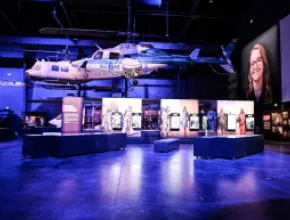In today’s economy, planners are looking for alternatives to higher-priced hotels. The natural substitute is a university venue. Collegiate meeting spaces offer excellent service, good accommodations and first-rate audiovisual technology often for a lot less.
“During a recession, universities become very attractive for planners,” says Deborah Blom, executive director for the Association of Collegiate Conference & Event Directors-International (ACCED-I). “The appeal is strong for regional meetings in particular.”
She says she’s seen an increase in meetings business. But it’s not all positive news. The recession may also be affecting collegiate conference business as it has other types of conferences.
“A few of our [board] members have reported an increase in meetings business, but it’s a mixed bag,” Blom says. “There are indications that the recession is affecting university venues because there have been a few cancellations that can be related to the economy.”
Nonprofit groups, state and federal agencies and youth and sports camps convene at collegiate conference space because it can be had at a reasonable cost. But these groups are recording salary cuts and layoffs.
One of those groups, the Coalition for the Advancement of Jewish Education (CAJE), announced earlier this year that not only was it canceling its 2009 conference, which was expected to be held at a university venue in San Antonio, but that it was also disbanding entirely due to “the combination of past debt and the fragile economy.”
The news came after one of its most successful conferences, its 33rd conference, which was held at The University of Vermont (UVM) in 2008. In fact, Jeff Lasday, CAJE’s executive director, wrote in a statement on the group’s website that CAJE still owed money to UVM and was seeking donations.
“So far it seems that collegiate venues are getting a healthy number of bookings, but it’s a wait-and-see situation,” Blom says. “Universities don’t know if these groups will end up canceling events later in the year.”
A significant amount of the event business university venues receive is comprised of youth groups and camps. Parents may end up not sending their children to these events because of economic concerns, leading to decreased numbers at events or possibly a cancellation of the event entirely.
Complicating matters is that hiring freezes are in effect at some college campuses due to budget shortfalls that could affect the level of service groups receive at university venues. Many conference services at colleges hire students during the summer when a lot of groups come to colleges for their meetings.
“When you factor in all these things, it’s not a pretty picture,” Blom says.
One-Stop Shop
However, Blom says she is hopeful about the association’s One-Stop Shop Certification program. The program has been in place for two years.
While campus venues offer great price points, ambience and variety, colleges can be perceived as too complex. A one-stop shop venue delivers on the promise of “one contact, one contract and one bill,” Blom says.
This streamlining of conference and event coordination is intended to more closely match the practices of finer hotels and convention facilities.
“Planners generally don’t like the idea of dealing with one contact each for housing, meeting space, meals and parking,” Blom says.
To apply for certification, officials at university venues must prove that the campus already has demonstrated that it is a one-stop shop experience for planners. The association contacts three references for proof. The due diligence process is important because event services officials show a history of providing planners with one main contact, one contract and one bill, rather than promising that the campus will be a one-stop shop for planners going forward.
“One contact” means that arrangements will be handled through one department and primarily with one individual. Planners will not have to consult with every department on campus from which they would like to secure services.
Planners may work with a few individuals, depending on the institution and the planning phase. For example, a planner may work with one person for sales and contracting, another for finalizing services and another individual on-site during the event. So planners will not be working with more than one individual during a given phase of the event. Planners receive one contract and one bill from the university.
“It means that planners are able to approach these venues with confidence,” Blom says. “Certification is becoming more attractive in this economic environment.”
Campus Benefits
Universities often present groups with enviable recreational facilities, including swimming pools, tennis and racquetball courts, which university conference operators say few other types of venues can match.
“A university has so many resources in a compact space for groups,” says Sharon Seagren, director of conference services at the University of Wisconsin at Madison (UW). “College campuses can offer more than a pool and a golf course.”
Groups with sophisticated technical needs are well-served at college campuses because their computer labs support the computer needs of a significant student population.
“Institutions have AV equipment built right in and have great Internet connections,” Blom says. “It’s a huge plus.”
The Conference Center at Bentley University in Waltham, Mass., provides 12,000 square feet of conference space, including a ballroom that can easily accommodate 400.
Technology is an important component of the center, says Rob Webb, president of ACCED-I and director of the center on campus in Waltham, which is located 10 miles west of Boston.
The conference center, which is celebrating its 25th anniversary this year, recently wrapped up a renovation and is getting set to launch the use of call buttons for immediate assistance.
“Say someone in room 305 needs more coffee or there’s an AV issue, he presses a button and help arrives,” Webb says. “We already use a call button network in our classrooms when an instructor needs something from the media department.”
Bentley features several labs for students, in addition to computer labs, that have also served groups well.
“We had some financial planners use our trading room lab for one of their breakout sessions,” Webb says. “The computer simulates trading stocks in real time.”
Like many university venues, Bentley’s center has a front desk that’s staffed seven days a week just like you’d find at a hotel, Webb notes.
All this technology and service does not come at a price, at least not at the price planners would expect to get at a conventional venue.
“Bentley provides services to planners that are at least half of the rates they’d get at a hotel,” Webb says.
Better Experience
College campuses have long been popular places to gather for workshops in classrooms and stays in dormitories. With an increase in event business, the introduction of on-campus professional conference centers, as well as the renovation of existing facilities as the need arises, continue to be trends. Another trend is building facilities for a wider range of groups.
In UW’s case, two new residence halls were built for adults.
“There are some adults who might not want the experience of the traditional residence hall, in which many residents share one bathroom,” Seagren says.
The thinking is that these new buildings will attract more groups to the campus, specifically adult groups. They are also designed to give these groups a better experience during their stay at UW, where academic research and youth groups make up 80 percent of group business and business conferences make up 20 percent, according to Seagren.
Blom says that many institutions, especially those that are One-Stop Shop certified, are happy to work with planners to customize itineraries, for instance planning a trip to a nearby off-site observatory for a group interested in astronomy.
One reason that the American Association of Ornithologists selected the University of Pennsylvania (Penn) this year for its conference was the college’s Morris Arboretum located about 20 miles outside of Philadelphia, notes Jeffrey Barta, director of sales and marketing for conference services at Penn. The arboretum, with over 13,000 plants in an English garden setting with Japanese influences, was a major attraction for the group of zoologists who study birds.
University venues present planners with more than affordable meeting space, top-notch technology and hotel-like services; they can also offer content for conferences.
Institutions employ a wealth of faculty with a lot of knowledge. Groups can tap into this by having a faculty member as a guest speaker or have a professor fill in when a speaker cancels. These scenarios occur frequently, Webb notes.
“Faculty members are usually very happy to speak and share what they know,” he says.
Since universities run the spectrum of disciplines, any group is likely to find a faculty member who can speak to its particular interest.
University venues also provide a nice change of pace from the traditional hotel.
“People are tired of the traditional ballroom,” Barta says. “They want variety and a change of pace. College campuses can be very refreshing.”
Barta adds that while Penn’s campus is located in the heart of Philadelphia, its lush trees, historic buildings and lack of automobiles are a welcome respite from the urban bustle.
Seagren concurs, adding that the atmosphere of a college campus is a great place for meetings.
“When you want people to come together to come up with creative solutions, the collegiate setting is a great environment,” she says.
Even though colleges provide a getaway, many are located close to thriving metropolises with a multitude of entertainment options.
“It’s almost like you’ve gotten away to the countryside at Penn,” Barta says. “The campus is in the middle of the city, but you don’t feel like you’re in the city. But then the city is so close—within 10 minutes—with so many attractions and historical sites.”
While Penn does not have dedicated conference space, the campus, like many collegiate venues, makes use of its multipurpose building, many classrooms and outdoor spaces.
Webb says that Bentley’s rate of repeat group business is 70 percent.
A collegiate group experience is “the best of both worlds for planners,” Webb says. “Great service and affordability.”





